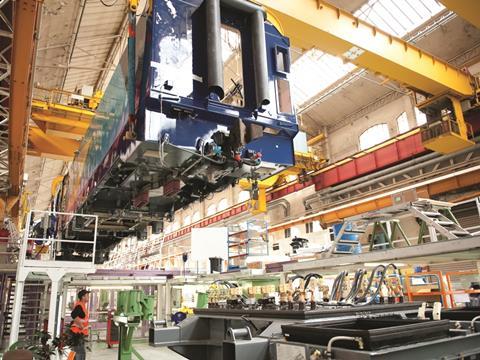
FRANCE: A short-term order for TGV trainsets and shunting locomotives and a longer-term diversification programme are at the heart of a rescue plan to preserve rail vehicle manufacturing and related industrial activity in Belfort, which was unveiled by the French Secretary of State for Industry Christophe Sirugue and Alstom President Henri Poupart-Lafarge on October 4.
The plan has been developed following Alstom’s announcement on September 7 that it intended to cease locomotive production at its Belfort plant by the end of 2018, transferring assembly work to its factory in Reichshoffen and leaving just a small maintenance business in Belfort.
That announcement provoked a furious reaction from local politicians and trade union representatives, and prompted a series of negotiations between Alstom and the government with a view to retaining more work at Belfort. The result of the negotiations is that the government has asked national operator SNCF to confirm a widely-expected order for six TGV trainsets to operate Paris – Milano cross-border services, while infrastructure manager SNCF Réseau is to order 20 shunting locomotives for rescue work and other operational support duties.
In addition, the government itself is to order a further 15 Euroduplex high speed trainsets to work Intercités services on the Bordeaux – Marseille cross-country route, which currently features no dedicated high speed infrastructure. The government says that this order is being placed ‘in anticipation of the future completion of the Bordeaux – Toulouse and Perpignan – Montpellier high speed lines’. The government says that it also expects to confirm ‘by the end of November’ an order for a further 30 inter-city trainsets for long-distance conventional services; these would be produced by Alstom at Reichshoffen.
Looking to the future, Alstom has committed to invest €30m in Belfort over the next two years to support development of the ‘TGV of the future’. This is being taken forward by its SpeedInnov joint venture with ADEME, a government agency providing funding for projects aimed at reducing environmental impact and energy consumption. A further €30m will support the Belfort factory as it seeks to develop a novel shunting locomotive design for hybrid or diesel operation, which would be ‘well suited to the needs of the market’.
The agreement also foresees more investment in maintenance and servicing at Belfort, where €5m is to be spent to ensure the plant becomes ‘the European reference point’ for Alstom locomotive and power car maintenance and overhaul.
A further €5m is to be spent to develop the products and services offered from Belfort, in line with wider industrial and sustainability goals. The agreement suggests that the plant could begin to produce ‘other types of rail vehicle’ and electric road vehicles; Alstom says this diversification could be supported by third parties and new investors.
‘This plan, built through a dialogue between all concerned parties will bring solutions for the workload issue and longer-term perspectives for Belfort site’, said Finance Minister Michel Sapin. ‘It falls within an approach that aims at defending and promoting the French railway industry.’

















